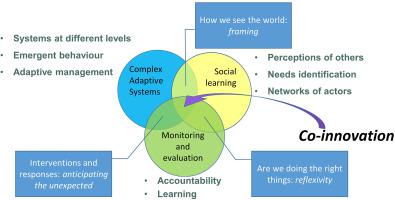Agricultural Systems ( IF 6.1 ) Pub Date : 2021-02-18 , DOI: 10.1016/j.agsy.2021.103103 Walter A.H. Rossing , Maria Marta Albicette , Veronica Aguerre , Carolina Leoni , Andrea Ruggia , Santiago Dogliotti

|
Context
Despite a wealth of analytical knowledge on factors and processes that operate to slow down or impede sustainability transitions in various sectors of society, design-oriented researchers face a lack of guidance on the ‘how to’ question for developing knowledge to support sustainability changes. From 2007, we crafted co-innovation as an approach for governance and management of change-oriented projects, combining three domains; a complex adaptive systems perspective, a social learning setting, and dynamic monitoring and evaluation.
Objective
This paper sets out to describe the co-innovation approach and draw lessons from its application in projects on ecological intensification in Uruguay and the European Union.
Methods
We used an analytical framework for evaluating sustainability transition experiments, which considers project features that provide insights into the contribution to sustainability transformations by project outputs, outcomes, processes and inputs, and their interactions. Empirical information on 6 cases from 3 projects was collected through in-depth interviews with former project staff, group discussion, and project documentation. This enabled a reflexive evaluation of co-innovation.
Results and conclusions
Outputs showed substantial variation among the cases despite a similar approach to project governance and management. More significant contributions to sustainability transitions were associated with in-depth project preparation, a focus at the farm-level instead of the crop or field level, connections during the project's lifetime with regional innovation system actors, and frequent facilitated interactions among project actors to reflect on results, wider system implications, and project direction. We discuss the results in relation to the three domains of co-innovation. To enhance the role of projects in destabilizing currently unsustainable systems we highlight: reconsidering the role of projects as a business model; stimulating institutional learning from previous change-oriented projects; and making funding more adaptive to evolving project needs.
Significance
With most of the budget for agricultural research-for-change spent through projects, how projects are conducted is a critical determinant of the rate of sustainability transitions. Effective disruption of unsustainable practices through project interventions requires rethinking linear cause-effect relations to include project governance and management approaches based on complex adaptive systems thinking, social learning settings, and monitoring geared to adaptation and learning.
中文翻译:

拟订有关生态集约化的可行知识:乌拉圭和欧洲共同创新方法的经验教训
语境
尽管有丰富的分析知识可以了解各种因素和过程,这些因素和过程可用来减慢或阻碍社会各个部门的可持续发展转型,但面向设计的研究人员仍缺乏有关如何开发知识以支持可持续发展的“方法”问题的指导。从2007年开始,我们将协同创新作为一种面向变更的项目的治理和管理方法,将三个领域结合在一起。复杂的适应性系统视角,社交学习环境以及动态监控和评估。
客观的
本文着手描述共同创新的方法,并从其在乌拉圭和欧盟的生态集约化项目中的应用中吸取教训。
方法
我们使用了一个分析框架来评估可持续性过渡实验,该框架考虑了项目特征,这些特征可以通过项目输出,结果,过程和输入以及它们之间的相互作用来洞察对可持续性转型的贡献。通过与前项目人员的深入访谈,小组讨论和项目文档,收集了来自3个项目的6个案例的经验信息。这样就可以对联合创新进行反思性评估。
结果与结论
尽管在项目治理和管理方面采取了类似的方法,但案例之间的产出仍存在很大差异。深入的项目准备,关注农场一级而不是作物或田地一级,项目生命周期内与区域创新系统参与者之间的联系以及项目参与者之间频繁的互动促进了对可持续发展转变的更大贡献。结果,更广泛的系统含义和项目方向。我们讨论与合作创新三个领域相关的结果。为了增强项目在破坏当前不可持续的系统中的作用,我们强调:重新考虑项目作为业务模型的作用;从以前的面向变更的项目中激发机构学习;
意义
通过项目花费大部分用于农业研究的预算,项目的进行方式是可持续性转变速度的关键决定因素。通过项目干预措施有效地对不可持续的做法进行破坏,需要重新考虑线性因果关系,以基于复杂的适应性系统思维,社会学习环境以及适应和学习的监控,来包括项目治理和管理方法。











































 京公网安备 11010802027423号
京公网安备 11010802027423号